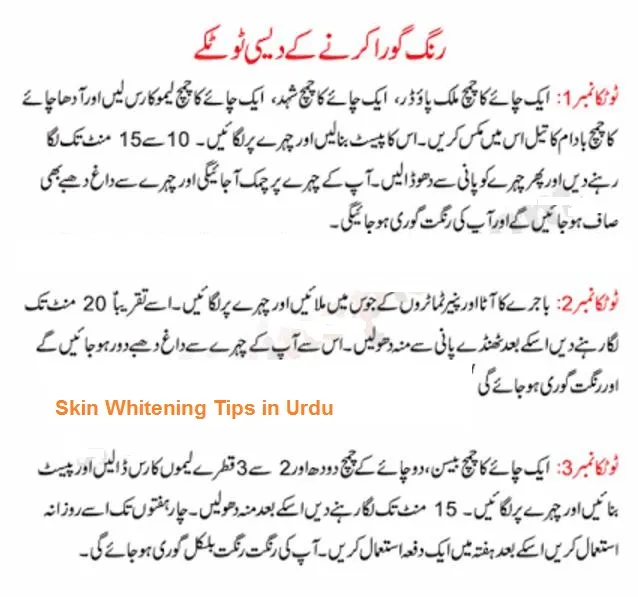How to Get Brighter Skin in Urdu 7 Tips
Achieving brighter, more radiant skin is a common aspiration in many cultures, including Urdu-speaking communities. The desire for fair and glowing skin often leads individuals to seek effective and safe methods. This guide provides seven practical tips, rooted in both traditional wisdom and modern skincare science, tailored for those seeking skin whitening in Urdu. These tips encompass a holistic approach, focusing not just on topical treatments but also on lifestyle choices that contribute to overall skin health and radiance. By incorporating these strategies, individuals can work towards achieving their desired skin tone while maintaining healthy and vibrant skin.
Understanding Skin Whitening in Urdu
Skin whitening, or skin lightening, is a practice aimed at reducing the melanin pigment in the skin to give it a lighter appearance. In Urdu-speaking communities, this can be a significant aspect of beauty standards, influenced by both cultural preferences and historical factors. It’s essential to approach skin whitening with a clear understanding of the processes involved and the potential risks and benefits. This involves being aware of the various methods, from natural remedies to cosmetic treatments, and making informed decisions based on individual skin types and health considerations. Furthermore, understanding the context of these practices within Urdu culture is crucial for respectful and effective skin care.
The Science Behind Skin Whitening

Skin whitening works by targeting melanin, the pigment responsible for skin color. Various ingredients and treatments aim to inhibit melanin production or promote its removal. Common mechanisms include the use of tyrosinase inhibitors (like vitamin C or hydroquinone), which disrupt melanin synthesis, and exfoliants that remove the top layers of skin containing melanin. The effectiveness and safety of these methods can vary greatly depending on the concentration of active ingredients, the individual’s skin type, and the duration of use. It’s important to research and understand the science behind any product or treatment before using it, ensuring it aligns with your skin’s needs and avoids potential adverse effects.
Cultural Perspectives on Skin Whitening in Urdu
In Urdu culture, the perception of skin tone can be influenced by historical, social, and even religious factors. Fair skin has often been associated with beauty, social status, and access to opportunities. These perceptions can drive the popularity of skin whitening practices. However, it’s crucial to recognize that beauty standards are evolving, and there’s an increasing appreciation for diverse skin tones. As you explore skin whitening tips in Urdu, it’s important to balance cultural influences with a focus on overall skin health and self-acceptance. Embrace your natural beauty while striving for skin that is healthy, radiant, and well-cared-for.
7 Effective Skin Whitening Tips in Urdu
These tips combine traditional remedies with modern skincare principles, ensuring a safe and effective approach to skin whitening in Urdu. Consistency is key, and patience is required to see noticeable results. Always prioritize your skin’s health and consult with a dermatologist if you have any concerns or pre-existing skin conditions. This holistic approach emphasizes both topical treatments and lifestyle adjustments to help you achieve brighter and healthier skin.
Tip 1 Use Homemade Face Masks

Homemade face masks are a cornerstone of natural skincare in many Urdu-speaking households. They are cost-effective, customizable, and often use ingredients readily available in your kitchen. Face masks can help brighten the skin, reduce dark spots, and improve overall complexion. The choice of ingredients is crucial, as different components offer unique benefits. When using homemade masks, always perform a patch test on a small area of skin to check for any allergic reactions or sensitivities before applying the mask to your entire face. Remember to follow recommended application times and use these masks consistently for best results.
Ingredients for Face Masks
Popular ingredients for skin whitening face masks include gram flour (besan), turmeric (haldi), yogurt, honey, lemon juice, and milk. Gram flour gently exfoliates and brightens skin, while turmeric has anti-inflammatory and antioxidant properties. Yogurt contains lactic acid, which exfoliates and improves skin tone. Honey moisturizes and has antibacterial effects, and lemon juice, rich in vitamin C, can lighten dark spots (use with caution, as it can increase sun sensitivity). Milk, especially raw milk, is believed to have skin-lightening properties. Experiment with different combinations to find what works best for your skin. For example, a mixture of besan, haldi, and yogurt can create a brightening and cleansing mask.
How to Prepare and Apply Face Masks
To prepare a face mask, mix the chosen ingredients in a clean bowl to form a smooth paste. Adjust the consistency with water or rose water as needed. Before application, cleanse your face thoroughly to remove dirt and makeup. Apply the mask evenly to your face and neck, avoiding the eye area. Leave the mask on for 15-20 minutes, or as recommended by your chosen recipe. Rinse with lukewarm water and gently pat your skin dry. Follow with a moisturizer to hydrate your skin. Use face masks 1-2 times a week for optimal results. Always choose fresh ingredients and prepare masks just before use to preserve their effectiveness.
Tip 2 Incorporate Natural Exfoliation

Exfoliation is the process of removing dead skin cells from the surface of the skin, revealing fresher, brighter skin underneath. It is a crucial step in any skin whitening routine. Regular exfoliation helps to even out skin tone, reduce the appearance of dark spots and hyperpigmentation, and improve the absorption of skincare products. There are various methods of exfoliation, including physical and chemical exfoliants, each with their own benefits and potential drawbacks. When incorporating exfoliation into your routine, consider your skin type and choose the gentlest method that is effective for you.
Benefits of Exfoliation for Skin Whitening
Exfoliation provides several key benefits that directly contribute to brighter skin. By removing dead skin cells, it reveals the underlying fresh and glowing skin, thus reducing the appearance of dullness. It also helps to diminish the appearance of dark spots and hyperpigmentation by sloughing away the surface layer containing excess melanin. Furthermore, exfoliation enhances the effectiveness of skincare products by allowing them to penetrate deeper into the skin. By removing the barrier of dead skin cells, your serums, moisturizers, and other treatments can work more efficiently. This process contributes to a more even skin tone and texture, making your skin look healthier and more radiant.
Natural Exfoliants You Can Use
Several natural exfoliants are readily available and suitable for skin whitening. Gentle options include finely ground oatmeal, sugar, and coffee grounds. Oatmeal soothes the skin while providing mild exfoliation. Sugar can be used in scrubs, mixed with honey or oil. Coffee grounds offer a moderate level of exfoliation and can also help to reduce the appearance of cellulite. For chemical exfoliation, consider ingredients like lactic acid (found in yogurt) or alpha-hydroxy acids (AHAs), which gently dissolve dead skin cells. Always perform a patch test before using any new exfoliant and avoid over-exfoliating, which can lead to irritation and sensitivity. Exfoliate 1-2 times per week based on your skin’s tolerance.
Tip 3 Stay Hydrated

Hydration is fundamental for overall health, including the health and appearance of your skin. Drinking enough water helps maintain skin elasticity, promotes a healthy glow, and aids in the elimination of toxins that can lead to dullness. Dehydrated skin can appear dry, flaky, and more prone to wrinkles and fine lines, while hydrated skin looks plump, supple, and radiant. Adequate hydration supports all cellular functions, including skin cell turnover and repair, contributing to a brighter and more even skin tone. Making water your primary beverage and staying consistently hydrated is one of the simplest, yet most impactful steps you can take for skin health.
The Importance of Water for Skin Health
Water plays a crucial role in maintaining skin health in multiple ways. It helps to transport nutrients to skin cells and remove waste products, keeping the skin cells functioning optimally. Water also maintains the skin’s elasticity, making it look more youthful and less prone to wrinkles. Proper hydration supports the skin’s natural barrier function, helping it to protect against environmental damage and retain moisture. By drinking sufficient water, you can prevent dryness and improve the overall texture and appearance of your skin. Dehydration, on the other hand, can exacerbate skin problems and diminish its natural radiance.
How Much Water to Drink Daily
The general recommendation is to drink at least eight glasses of water (approximately 2 liters) per day. However, individual water needs can vary based on factors such as activity level, climate, and overall health. If you are physically active, live in a warm climate, or sweat heavily, you may need to drink more water. Pay attention to your body’s signals, such as thirst and the color of your urine (which should be pale yellow). Incorporating water-rich foods like fruits and vegetables can also contribute to your daily hydration intake. Aim to sip water consistently throughout the day rather than drinking large amounts at once. Making water readily available, such as carrying a water bottle, can help you stay hydrated.
Tip 4 Use Sunscreen Daily

Protecting your skin from the sun is essential for overall skin health and is non-negotiable for skin whitening. Exposure to ultraviolet (UV) radiation from the sun can worsen hyperpigmentation, cause dark spots, and accelerate signs of aging. Using sunscreen daily is the most effective way to prevent these issues and maintain a brighter complexion. Sunscreen acts as a protective barrier, absorbing or reflecting harmful UV rays before they can damage the skin. It’s crucial to use sunscreen even on cloudy days, as UV rays can penetrate through clouds. Make sunscreen a non-negotiable part of your daily skincare routine to safeguard your skin and maintain your results.
Why Sunscreen is Crucial for Skin Whitening
Sunscreen is particularly important when you are trying to achieve skin whitening because UV exposure stimulates the production of melanin, which can counteract any efforts to lighten the skin. It prevents the formation of new dark spots and helps to prevent existing hyperpigmentation from getting darker. Without consistent sunscreen use, skin whitening treatments and remedies can be significantly less effective. Furthermore, sunscreen helps to protect the skin from sun damage, reducing the risk of premature aging, wrinkles, and other signs of sun-related skin damage. By incorporating daily sunscreen use, you are investing in the long-term health and beauty of your skin.
Choosing the Right Sunscreen for Urdu Skin
When choosing a sunscreen, opt for a broad-spectrum formula that protects against both UVA and UVB rays. Look for a Sun Protection Factor (SPF) of 30 or higher. Consider your skin type when selecting a sunscreen. If you have oily skin, choose a lightweight, oil-free formula. For dry skin, a moisturizing sunscreen may be more suitable. Apply sunscreen generously and evenly to all exposed areas of skin, 20 minutes before sun exposure. Reapply every two hours, or more frequently if swimming or sweating. In Urdu-speaking communities, where the climate can be hot and sunny, consistent and proper sunscreen application is vital for skin health and whitening efforts. Consider purchasing a sunscreen that is easily accessible to you, for example a sunscreen that is common to your local market.
Tip 5 Maintain a Healthy Diet
A healthy diet is a cornerstone of healthy skin. The foods you consume provide essential nutrients that support skin cell function, promote skin repair, and protect against damage. A diet rich in vitamins, minerals, and antioxidants can significantly improve skin tone and texture, contributing to a brighter complexion. Incorporating a variety of nutrient-dense foods and avoiding processed foods and excessive sugar can have a profound impact on skin health. Think of your diet as an inside-out approach to skincare, nourishing your skin from within. The nutritional needs of the skin are best met with a diet balanced for your lifestyle.
Foods to Include in Your Diet
Focus on consuming foods that are rich in antioxidants, vitamins, and minerals. These include fruits and vegetables of various colors, lean proteins, and healthy fats. Fruits like berries, citrus fruits, and papayas are packed with antioxidants and vitamin C, which is essential for collagen production and skin brightening. Vegetables like leafy greens, carrots, and sweet potatoes provide vitamins A and E, both crucial for skin health. Incorporate lean proteins such as chicken, fish, and lentils, which provide amino acids for skin cell repair. Healthy fats from avocados, nuts, and olive oil support skin hydration and overall glow. Staying well-hydrated is also critical, so make sure you drink plenty of water and include water-rich foods in your diet.
Foods to Avoid for Brighter Skin
Certain foods can contribute to inflammation, acne, and dull skin, hindering your skin whitening efforts. Minimize or avoid processed foods, sugary drinks, and excessive sugar consumption, as they can lead to inflammation and glycation, which damages collagen and elastin. Limit your intake of refined carbohydrates and unhealthy fats. Additionally, it may be beneficial to limit dairy intake if you suspect it could be contributing to skin issues. Pay attention to how different foods affect your skin, and adjust your diet accordingly. A balanced diet focusing on whole, unprocessed foods supports skin health and enhances your skin-whitening routine.
Tip 6 Get Enough Sleep
Adequate sleep is crucial for overall health and well-being, and it plays a vital role in skin health. During sleep, your body repairs and rejuvenates itself, including skin cells. Lack of sleep can lead to dull skin, dark circles, and an overall tired appearance. Prioritizing sleep can significantly impact your skin’s appearance and contribute to a brighter, more youthful complexion. Getting enough sleep supports cellular repair and regeneration, making it essential for healthy and radiant skin. Aim for 7-9 hours of quality sleep each night.
The Connection Between Sleep and Skin Health
During sleep, the skin’s blood flow increases, allowing for more efficient repair of any damage. The body releases growth hormones during sleep, which aid in the production of collagen, a protein that maintains skin elasticity and firmness. Without adequate sleep, collagen production decreases, which can lead to wrinkles and fine lines. Lack of sleep increases the stress hormone cortisol, which can break down collagen and lead to inflammation, acne breakouts, and other skin issues. The skin also works to repair itself during sleep, replacing old and damaged cells with new ones. Ensuring you get enough sleep supports this natural process, resulting in a healthier and more radiant complexion.
Tips for Better Sleep
Establish a regular sleep schedule by going to bed and waking up around the same time each day, even on weekends. Create a relaxing bedtime routine to signal to your body that it’s time to sleep. This could include taking a warm bath, reading a book, or listening to calming music. Ensure your bedroom is dark, quiet, and cool to promote better sleep. Avoid caffeine and alcohol close to bedtime, as they can interfere with your sleep cycle. Limit screen time before bed, as the blue light emitted by electronic devices can disrupt melatonin production, a hormone that regulates sleep. If you have persistent sleep issues, consider consulting with a healthcare professional or sleep specialist.
Tip 7 Consider Natural Remedies
In Urdu culture and many other cultures, natural remedies have been used for generations to enhance skin appearance and address various skin concerns. These remedies often utilize readily available ingredients with properties that promote skin health and brightness. While natural remedies can be beneficial, it’s important to approach them with caution, understanding their potential benefits, and ensuring that you use them safely. Always test any new remedy on a small area of skin before widespread use to avoid adverse reactions. When used correctly and consistently, natural remedies can complement your skin whitening routine.
Popular Natural Remedies
Several natural remedies are popular for their potential skin whitening benefits. Aloe vera, known for its soothing and healing properties, can help to reduce inflammation and promote skin repair. Turmeric, due to its anti-inflammatory and antioxidant properties, is often used in face masks to brighten skin and reduce dark spots. Sandalwood paste is believed to cool and soothe the skin, while also helping to even out skin tone. Rose water is often used as a toner for its hydrating and skin-brightening properties. Applying these remedies topically, either alone or in combination, can help to enhance the effectiveness of your skincare routine.
Safety Precautions with Natural Remedies
While natural remedies are generally considered safe, it’s essential to exercise caution. Always perform a patch test on a small area of your skin before applying a remedy to your entire face or body, to check for allergic reactions or sensitivities. Be aware of potential interactions with other skincare products or medications you are using. Some natural remedies, such as lemon juice, can increase your skin’s sensitivity to sunlight, so always apply sunscreen if you use them. Choose high-quality, fresh ingredients and prepare remedies hygienically. If you experience any irritation, redness, or adverse reactions, discontinue use immediately. Consult with a dermatologist before trying new remedies, especially if you have sensitive skin or pre-existing skin conditions.
Conclusion Embracing Skin Whitening in Urdu
Achieving brighter skin is a journey that combines cultural traditions with modern skincare practices. By incorporating these seven tips, which include using homemade face masks, practicing natural exfoliation, staying hydrated, using sunscreen daily, eating a healthy diet, getting enough sleep, and considering natural remedies, individuals can work toward achieving their desired skin tone while also promoting healthy, radiant skin. Remember that consistency, patience, and a holistic approach are key to success. Prioritize your skin’s health and always make informed choices that align with your individual needs and values. Embrace your skin’s natural beauty as you work toward a brighter complexion. Remember to consult with a dermatologist to ensure that your skincare routine is suitable for your skin type and any specific concerns you may have.
